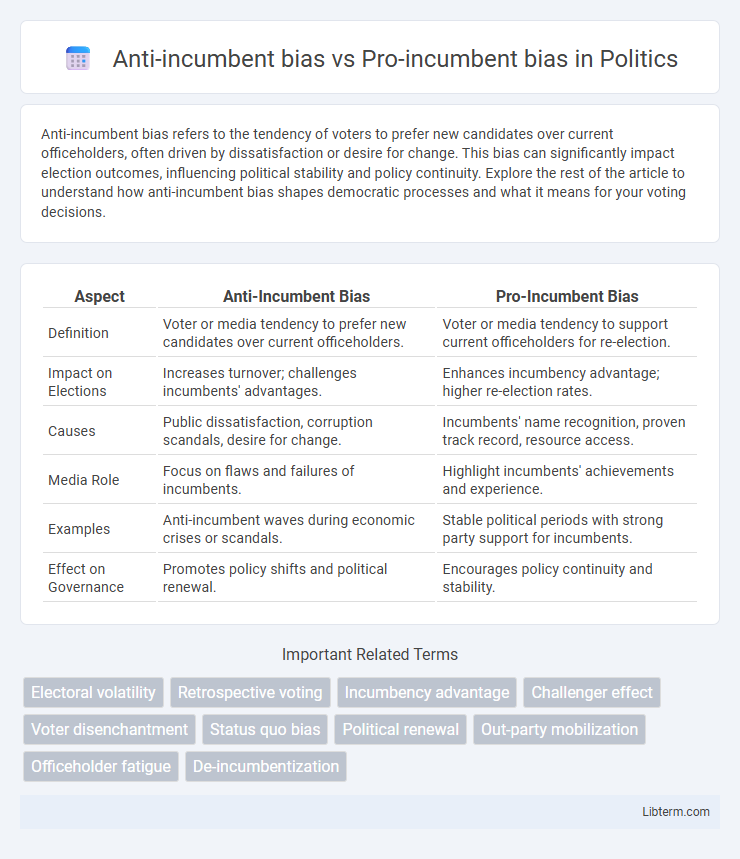Anti-incumbent bias refers to the tendency of voters to prefer new candidates over current officeholders, often driven by dissatisfaction or desire for change. This bias can significantly impact election outcomes, influencing political stability and policy continuity. Explore the rest of the article to understand how anti-incumbent bias shapes democratic processes and what it means for your voting decisions.
Table of Comparison
| Aspect | Anti-Incumbent Bias | Pro-Incumbent Bias |
|---|---|---|
| Definition | Voter or media tendency to prefer new candidates over current officeholders. | Voter or media tendency to support current officeholders for re-election. |
| Impact on Elections | Increases turnover; challenges incumbents' advantages. | Enhances incumbency advantage; higher re-election rates. |
| Causes | Public dissatisfaction, corruption scandals, desire for change. | Incumbents' name recognition, proven track record, resource access. |
| Media Role | Focus on flaws and failures of incumbents. | Highlight incumbents' achievements and experience. |
| Examples | Anti-incumbent waves during economic crises or scandals. | Stable political periods with strong party support for incumbents. |
| Effect on Governance | Promotes policy shifts and political renewal. | Encourages policy continuity and stability. |
Understanding Incumbency: Definitions and Concepts
Anti-incumbent bias refers to voter tendencies to favor challengers or new candidates over current officeholders, often driven by dissatisfaction with government performance or desire for change. Pro-incumbent bias describes voter preferences that advantage incumbents, typically due to perceived experience, name recognition, and established political networks. Understanding incumbency involves analyzing these biases in electoral behavior, incumbents' strategic advantages, and institutional factors that influence re-election outcomes.
The Roots of Anti-Incumbent Bias
Anti-incumbent bias often stems from voter dissatisfaction arising from unmet expectations, perceived government inefficiency, or corruption scandals. Historical trends and economic downturns amplify this bias as citizens hold current officeholders accountable for societal challenges. Media framing and political opposition narratives further deepen skepticism, reinforcing the roots of anti-incumbent sentiment in democratic systems.
Pro-Incumbent Bias: Causes and Mechanisms
Pro-incumbent bias arises from factors such as media favoritism, access to resources, and voter familiarity, which collectively strengthen an incumbent's electoral advantage. Incumbents benefit from established name recognition, substantial campaign funding, and positive media coverage that influence voter perception and reduce uncertainty. These mechanisms create a feedback loop reinforcing the incumbent's position by limiting the visibility and viability of challengers.
Psychological Factors Influencing Voter Bias
Psychological factors such as cognitive dissonance and confirmation bias contribute to pro-incumbent bias by causing voters to favor familiar candidates who align with their existing beliefs. Conversely, anti-incumbent bias often arises from frustration or disappointment with the status quo, leading voters to seek change and hold incumbents accountable. Social identity theory also plays a role as voters' alignment with political groups influences their predisposition toward either maintaining or rejecting current officeholders.
Media Influence on Incumbency Perception
Media influence plays a critical role in shaping public perception of incumbency by framing political narratives that can either amplify anti-incumbent bias or reinforce pro-incumbent bias. Negative media coverage, emphasizing scandals or policy failures, often fuels anti-incumbent sentiments, leading to voter dissatisfaction and electoral turnover. Conversely, favorable media portrayal highlighting achievements and stability tends to bolster pro-incumbent bias, increasing the likelihood of re-election and political continuity.
Historical Trends in Anti- and Pro-Incumbent Sentiment
Historical trends reveal fluctuating patterns of anti-incumbent and pro-incumbent bias shaped by economic conditions, political scandals, and policy outcomes. Periods of economic downturn or governmental corruption often intensify anti-incumbent sentiment, leading to electoral volatility and increased demands for political change. Conversely, sustained economic growth and effective governance foster pro-incumbent bias, enhancing electoral stability and reinforcing political incumbency.
Effects of Incumbency Bias on Election Outcomes
Anti-incumbent bias often leads to higher electoral volatility by increasing the likelihood of incumbents being voted out, which can result in significant shifts in political power and policy direction. Pro-incumbent bias, in contrast, tends to reinforce the status quo by providing incumbents with advantages such as name recognition, access to resources, and established voter networks, thereby increasing their chances of reelection. The overall effect of incumbency bias on election outcomes is a distortion of electoral fairness, as it either unfairly disadvantages challengers or perpetuates existing officeholders regardless of performance, impacting democratic representation and policy continuity.
Strategies Used by Incumbents to Counter Bias
Incumbents employ targeted communication strategies such as emphasizing legislative accomplishments and local constituency services to counter anti-incumbent bias. They leverage data-driven voter outreach and personalized messaging to reinforce their positive impact and maintain voter loyalty. Strategic resource allocation for grassroots mobilization and media campaigns further mitigates pro-incumbent bias by addressing public skepticism and reinforcing trust.
Policy Implications of Incumbency Bias
Anti-incumbent bias often leads to frequent political turnover, resulting in inconsistent policy implementation and challenges in long-term governance. Pro-incumbent bias, by contrast, facilitates policy continuity and stability but may encourage complacency and reduce accountability in public office. Understanding these biases is critical for designing electoral systems and institutional frameworks that balance responsiveness to voters with effective policy execution.
Addressing Bias: Toward Fairer Democratic Processes
Addressing anti-incumbent bias and pro-incumbent bias is crucial for fairer democratic processes, as both distort voter preferences and election outcomes. Implementing transparent electoral systems, strengthening voter education, and promoting unbiased media coverage can mitigate these biases. Ensuring equal access to information and leveling the playing field for challengers and incumbents fosters a more representative democracy.
Anti-incumbent bias Infographic

 libterm.com
libterm.com